Related Research Articles
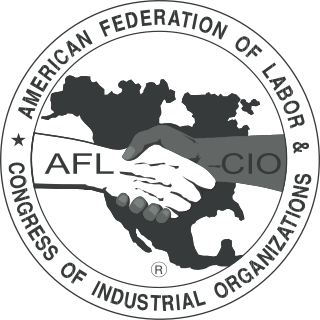
The American Federation of Labor and Congress of Industrial Organizations (AFL–CIO) is the largest federation of unions in the United States. It is made up of 60 national and international unions, together representing more than 12 million active and retired workers. The AFL–CIO engages in substantial political spending and activism, typically in support of progressive and pro-labor policies.

The United Farm Workers of America, or more commonly just United Farm Workers (UFW), is a labor union for farmworkers in the United States. It originated from the merger of two workers' rights organizations, the Agricultural Workers Organizing Committee (AWOC) led by organizer Larry Itliong, and the National Farm Workers Association (NFWA) led by César Chávez and Dolores Huerta. They became allied and transformed from workers' rights organizations into a union as a result of a series of strikes in 1965, when the mostly Filipino farmworkers of the AWOC in Delano, California, initiated a grape strike, and the NFWA went on strike in support. As a result of the commonality in goals and methods, the NFWA and the AWOC formed the United Farm Workers Organizing Committee on August 22, 1966. This organization was accepted into the AFL–CIO in 1972 and changed its name to the United Farm Workers Union.

The International Union, United Automobile, Aerospace, and Agricultural Implement Workers of America, better known as the United Auto Workers (UAW), is an American labor union that represents workers in the United States and Canada. It was founded as part of the Congress of Industrial Organizations (CIO) in the 1930s and grew rapidly from 1936 to the 1950s. The union played a major role in the liberal wing of the Democratic Party under the leadership of Walter Reuther. It was known for gaining high wages and pensions for auto workers, but it was unable to unionize auto plants built by foreign-based car makers in the South after the 1970s, and it went into a steady decline in membership; reasons for this included increased automation, decreased use of labor, movements of manufacturing, and increased globalization.

The International Brotherhood of Teamsters (IBT), also known as the Teamsters Union, is a labor union in the United States and Canada. Formed in 1903 by the merger of The Team Drivers International Union and The Teamsters National Union, the union now represents a diverse membership of blue-collar and professional workers in both the public and private sectors, totalling about 1.3 million in 2015. Formerly called the International Brotherhood of Teamsters, Chauffeurs, Warehousemen and Helpers of America, the IBT is a member of the Strategic Organizing Center and Canadian Labour Congress.

Service Employees International Union (SEIU) is a labor union representing almost 1.9 million workers in over 100 occupations in the United States and Canada. SEIU is focused on organizing workers in three sectors: healthcare, including hospital, home care and nursing home workers; public services ; and property services.

John Joseph Sweeney was an American labor leader who served as president of the AFL–CIO from 1995 to 2009.
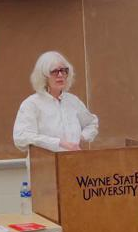
Jane Slaughter is an American journalist who writes frequently on labor affairs. Her writing has appeared in The Nation, The Progressive, Monthly Review, and In These Times. She is based in Detroit.
A comprehensive campaign is labor union organizing or a collective bargaining campaign with a heavy focus on research, the use of community coalition-building, publicity and public pressure, political and regulatory pressure, and economic and legal pressure in addition to traditional organizing tactics.

Eliseo Vasquez Medina is a Mexican-American labor union activist and leader, and advocate for immigration reform in the United States. From 1973 to 1978, he was a board member of the United Farm Workers. He is currently secretary-treasurer of the Service Employees International Union. He was previously an international executive vice president, the first Mexican American to serve on the union's executive board. Medina announced his resignation as an SEIU executive vice president effective October 1, 2013.
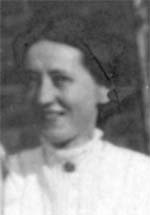
A union organizer is a specific type of trade union member or an appointed union official.
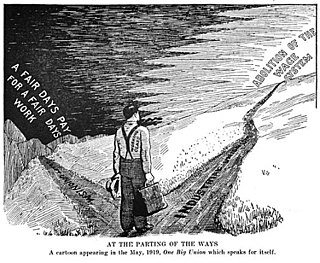
The Industrial Workers of the World (IWW) is a union of wage workers which was formed in Chicago in 1905 by militant unionists and their supporters due to anger over the conservatism, philosophy, and craft-based structure of the American Federation of Labor (AFL). Throughout the early part of the 20th century, the philosophy and tactics of the IWW were frequently in direct conflict with those of the AFL concerning the best ways to organize workers, and how to best improve the society in which they toiled. The AFL had one guiding principle—"pure and simple trade unionism", often summarized with the slogan "a fair day's pay for a fair day's work." The IWW embraced two guiding principles, fighting like the AFL for better wages, hours, and conditions, but also promoting an eventual, permanent solution to the problems of strikes, injunctions, bull pens, and union scabbing.

Kenneth T. Paff is one of the founders and current National Organizer of Teamsters for a Democratic Union, a rank-and-file union democracy movement organizing to reform the International Brotherhood of Teamsters (IBT), or Teamsters.
SEIU Member Activists for Reform Today (SMART) is a national organization of rank-and-file union members working for the democratic reform of the Service Employees International Union (SEIU). SEIU primarily represents workers in the public sector, healthcare industry, and property services. Today it is America's largest and fastest growing union with 2 million members, many of whom are minorities, immigrants, and women.
The California Agricultural Labor Relations Act (CALRA) is a landmark statute in United States labor law that was enacted by the state of California in 1975, establishing the right to collective bargaining for farmworkers in that state, a first in U.S. history.
Daniel H. La Botz is an American labor union activist, academic, journalist, and author. He was a co-founder of Teamsters for a Democratic Union (TDU) and has written extensively on worker rights in the United States and Mexico. He is a member of the socialist organization Solidarity, which describes itself as "a democratic, revolutionary socialist, feminist, anti-racist organization," which comes out of the Trotskyist tradition. La Botz ran in 2010 for a seat in the United States Senate for the Socialist Party. He is also a member of the Brooklyn branch of the Democratic Socialists of America and a co-editor of the socialist journal New Politics.
The Martin Luther King. Jr. County Labor Council, AFL–CIO, (MLKCLC) is the central body of labor organizations in King County, Washington. The MLKCLC is affiliated with the national AFL–CIO, the central labor organization in the United States, which represents more than 13 million working people. Over 125 organizations are affiliated with the MLKCLC, and more than 75,000 working men and women belong to Council-affiliated organizations. Not only does the MLKCLC support labor organizations, but it acts as a voice for the interests and needs of the working people in King County, WA.
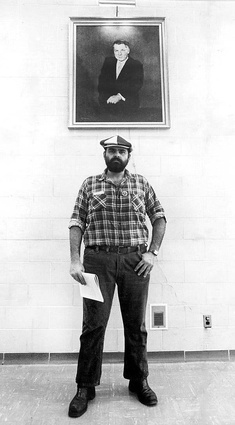
Pete Camarata was a Teamster labor activist and one of the founders of Teamsters for a Democratic Union a rank-and-file union democracy movement organizing to reform the International Brotherhood of Teamsters (IBT), or Teamsters.

The Coors strike and boycott was a series of boycotts and strike action against the Coors Brewing Company, based in Golden, Colorado, United States. Initially local, the boycott started in the late 1960s and continued through the 1970s, coinciding with a labor strike at the company's brewery in 1977. The strike ended the following year in failure for the union, which Coors forced to dissolve. The boycott, however, lasted until the mid-1980s, when it was more or less ended.
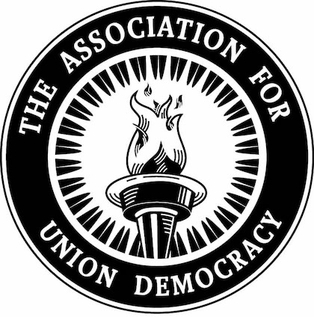
The Association for Union Democracy (AUD) is a non-profit organization based in Brooklyn, New York, which advocates for union democracy. Founded in 1969 by union reformer Herman Benson and Yale law professor Clyde Summers, the AUD has been called "labor's leading voice on democracy issues" by Labor Studies Journal.

Herman William Benson was an American union reformer and machinist, who founded and led the Association for Union Democracy (AUD), based in Brooklyn, New York. He fought corruption and racketeering within unions, defended rank-and-file union members' rights, and advocated union democracy for over 60 years. Following his death, New Politics called him "the best known advocate of union democracy in left labor circles".
References
- ↑ A Troublemakers' Handbook: How to Fight Back Where You Work and Win!. Labor Notes. 1991. p. 262. ISBN 0-914093-04-5.